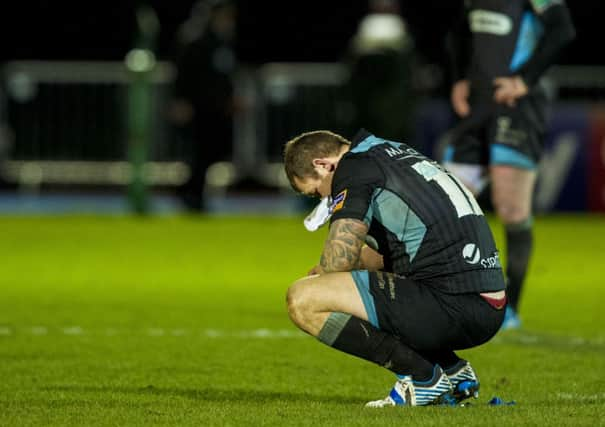Allan Massie: Heineken Cup hopes hang in balance


Connacht go to Toulouse and win. Glasgow and Edinburgh have each lost away in France, to Toulon and Perpignan respectively. On Saturday evening Leinster went to Franklin’s Gardens and demolished Northampton, a team lying second in the English Premiership, with a display of sparkling, imaginative and accurate rugby. On Sunday, Gloucester, who are having a miserable domestic season, came to Edinburgh and won comfortably.
All right, Edinburgh have been enduring difficult times. Their South African coach, Alan Solomons, insists that they are a work in progress. No doubt the work is being done; it’s the progress that is not much in evidence. Perhaps they’ll redeem themselves in the return match at Kingsholm tomorrow. Perhaps.
Advertisement
Hide AdAdvertisement
Hide AdGlasgow’s defeat in Cardiff was even more depressing because it was largely self-inflicted. Cardiff were missing a raft of Welsh international players, though one doesn’t make too much of that because every team is without a few internationals at this time of the year – Glasgow themselves could point to the absence of four or five. In any case, so many internationals are now played, and consequently so many players capped, that almost any club in the Heineken will usually field more capped than non-capped players. There were, I think, eleven – not all of course Scottish – in Glasgow’s starting XV – and several more on the bench.
Glasgow lost because they didn’t protect the ball at the breakdown in the face of vigorous counter-rucking by Cardiff, because they were slow in moving the ball to the backs, and because of a number of inexcusable individual mistakes, Duncan Weir’s dropping of a pass in their in-goal area being only the most conspicuous. This was a pity because in other respects he had a fine game, though a kick on the full into touch after the ball had been carried back into the Glasgow 22 was also costly.
Niko Matawalu is a wonderfully exciting player, who has already done remarkable things for Glasgow. But he tends to try too much on his own, and, now that he is in his second season with the club, the opposition are alert to the danger he presents. He might now be more effective if he exercised a bit of self-restraint, biding his time and concentrating on moving the ball quickly away, till the opposition relaxes its watch on him, and then breaking. As it is, his habit of almost always taking three or fours steps, as he looks for an opening, before passing, is mucking up the back division.
Even so, despite everything, Glasgow got themselves back in a position from which they might – and perhaps should – have won the game, only to give it away with a careless pass intercepted by Alex Cuthbert who galloped away to score. One hopes that Glasgow will have had their revenge by the time this column appears, but even if they have, it’s probably too late to salvage their Heineken campaign, and like Edinburgh they will have to concentrate on the Pro12 league. Since the Heineken began there have been only two seasons when Scotland had an interest in the knock-out stages, and this really isn’t good enough.
If you went through the team lists of the Leinster starting XV at Northampton and the Glasgow one at Cardiff, there would be few obvious disparities. In some positions – the centre and the back-row – Leinster would have the advantage, while you might also conclude that on that match’s form Sean Cronin is the best hooker in the Six Nations; he certainly completely outshone England’s Dylan Hartley. But elsewhere there would be nothing to choose between the two sides, and in some positions Glasgow would have the edge. Young Ian Madigan had an outstanding game at fly-half for Leinster, but he is no more talented than Duncan Weir and is also less experienced.
It isn’t really a matter of individuals. Glasgow have played some very good rugby over the last 12 months and will doubtless do so again.
This makes what looks like being another Heineken failure all the more disappointing. The SRU has spent an awful lot of money on the two pro teams, and its investment is not being adequately rewarded. Players are regularly trotted out to say all the right things to the press, but then fail to deliver on the field. It sometimes seems that they are better schooled in PR than in playing rugby.
Likewise talk of improving performance becomes wearisome, and is unconvincing, if it is not backed up by results. Fewer interviews and more tries might be the best New Year resolution for the pro teams and the coaching staff.